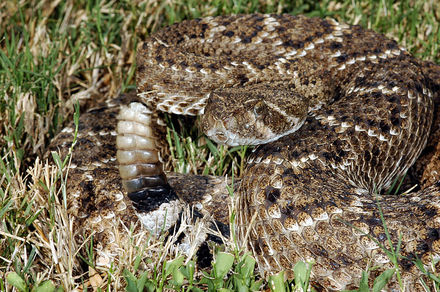Summer is here and with increases in temperature in many areas, snakes are on the move, often sunning themselves along horse traiIs and closer to urban areas where people are out walking their horses. What does this mean for horse owners?

Well-camouflaged diamond backed rattlesnake
Factors that determine the outcome of a bite by a poisonous snake include the type of snake, the bite location, the horse's reaction to the venom and how soon after the bite you act.
Although no reliable statistics are available about the number of horses bitten by snakes each year, if a horse is on the receiving end of a snake bite, knowing what to do is extremely important and may save the horse's life.
Unlike the rattlesnake that gives fair warning, many snakes are secretive, shy and deadly silent. Some rely on camouflage to remain undetected and silently allow people or horses to pass within striking distance. Many are reluctant to bite unless quite provoked.
Clinical signs of snakebite in horses vary widely but generally include pain and swelling at the bite site, and often sloughing of tissues near the bite. Bite wounds may not be readily apparent.
Dry bites with little venom injected or bites from copperhead snakes often cause only mild signs. Bites from dangerous species of snakes and large doses of venom can cause marked pain and swelling, hemorrhage, cardiac arrhythmias, shock, collapse, and even death.
With neurotoxic venoms, paralysis can occur. Horses bitten on the nose can develop nasal swelling and respiratory distress.
Veterinarians encourage trail riders to carry two 6-inch pieces of garden hose and advise these clients to pass the lubricated hose into the nostrils of a horse that is bitten on the nose to keep airways open.
These horses then can be transported and treated.can be passed into the nasal passages to maintain breathing. This is essential, since horses are obligate nose-breathers, meaning they only breathe through their noses, not through their mouths.
If a snake has bitten your horse, call your vet at once. Fortunately, most horse snakebites aren't fatal, because of a horse's sheer size. Factors that will determine the outcome include the type of snake and the bite location, the horse's reaction to the venom and how soon after the bite you act.
The best first aid is to keep the horse calm and arrange for immediate veterinary care. No first-aid treatments performed by owners in the field have proven particularly helpful, and many folk remedies can be harmful.
